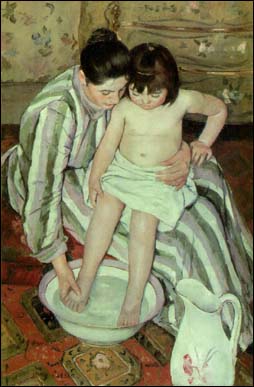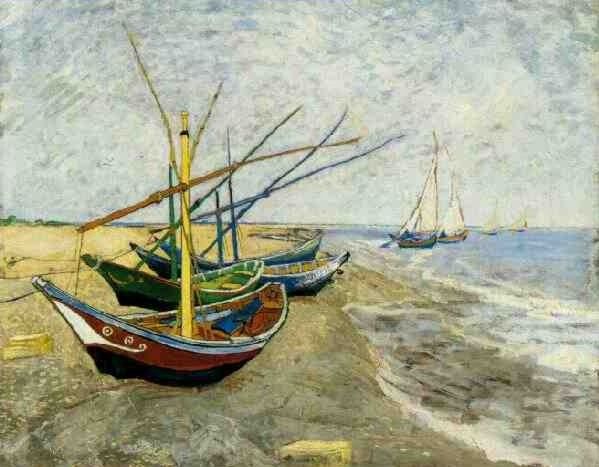Ex Church of Christ support groupHome * Website Purpose * History * UnBiblical Teachings * Spiritual Abuse Jesus' View of God * Faith & Works * New Covenant * The Pattern * Romans 14 |
|
|
Race Relations ______________________________________________ Both Alexander Campbell and Barton W. Stone were active in educating and freeing their slaves, as well as advocating the repatriation of slaves to Africa. Barton W. Stone's influence helped to foster racially integrated congregations among the poor frontierspeople (until the congregations became richer in the 1920s). Barton W. Stone began a movement among the churches in which he worked, such that slaves were freed in an entire region of Kentucky and Tennessee (1810-1811) long before others began freeing slaves (1830). "Talk no more of being washed of your sins by immersion," Stone wrote, "when we see you living in sin; and many of you living on the gains of oppressing the poor African." When the Quakers were calling for the abolition of slavery, Thomas and Alexander Campbell also opposed slavery (1830-1860). Having owned a few slaves, they educated them and gradually freed them. They took a middle road, and wrote against the abuses of slavery, but not slavery itself. But the Restoration Movement split in 1863 (actually between 1840 and 1880) between the north and the south, the north becoming the Christian Church (and Disciples of Christ), and the south becoming the Churches of Christ. The reasons for the split, as told by the Churches of Christ, was that the Christian Church wanted to have instruments of music, and they had established the American Christian Missionary Society in 1849 with representatives who voted, which was the first step away from a purely congregational organization to a denominational organization with a hierarchy, something they found unscriptural, and reminiscent of Roman Catholicism. But the way the Disciples of Christ and Christian Church tell the story is that the Convention endorsed Abolition in 1842, and the Union in 1863, and that alienated the southern Churches of Christ. Terrified of the freed black man, they espoused the Lost Cause. The Lost Cause, memorialized in the book Gone With the Wind, taught that black men corrupted white women's morals, or that black men had an uncontrolled sexuality. The Lost Cause centered around the belief that the South had been abused terribly by the North, that the South is the carrier of the flame of Tradition, Respect, Patriotism, Family Values and gentility. The Lost Cause held that blacks are more suited to subservience, most slaves had been treated well under slavery, and were harmed by being freed, could not handle the responsibilities of freedom, and that black people had to be taught their place. The Lost Cause fostered lynching as a way to teach black people humility, and not to have sex with whites, and to prevent them from protesting when they were denied voting rights. The Lost Cause has a focus on social status and hierarchy. Outside the Restoration Movement the Southern Baptist Church was established after the Civil War in part because they did not want to be a part of the northern Baptists (American Baptist Churches) who opposed slavery and supported integration. At the same time, the Southern Methodists and the southern Presbyterians separated from their northern counterparts.
Tolbert Fanning was converted by Stone-ite preachers, and Tolbert Fanning had a protege, David Lipscomb, editor of The Gospel Advocate. David Lipscomb in 1878 heard of a church in McKinney, Texas that had refused membership to a black man, and he wrote: "God saves the negro equally with the white man when he [the new convert] puts Him on by being buried with Him in baptism." He went on to call the congregation to task that refused the black man membership. In 1907 he championed the cause of integrating congregations in Nashville, TN. Here is an article by Foy E. Wallace, editor of Bible Banner: Bible Banner (March 1941): 7.NEGRO MEETINGS FOR WHITE PEOPLE "The manner in which the brethren in some quarters are going in for the negro meetings leads one to wonder whether they are trying to make white folks out of the negroes or negroes out of the white folks. The trend of the general mix-up seems to be toward the latter. Reliable reports have come to me of white women, members of the church, becoming so animated over a certain colored preacher as to go up to him after a sermon and shake hands with him holding his hand in both of theirs. That kind of thing will turn the head of most white preachers, and sometimes affect their conduct, and anybody ought to know that it will make fools out of the negroes. For any woman in the church to so far forget her dignity, and lower herself so, just because a negro has learned enough about the gospel to preach it to his race, is pitiable indeed. Her husband should take her in charge unless he has gone crazy, too. In that case somebody ought to take both of them in charge. "Reliable brethren in the Valley have reported the definite inclinations of the negro man and his wife in charge of the orphan home for colored children at Combes toward social equality. They are supposed to be members of the church, and some of the white brethren are apparently encouraging them. It is said that these two negroes have privately stated that they favor social equality and are working for it. The young editor of Christian Soldier, in the valley, admits that he roomed with the negro preacher, R. N. Hogan, and slept in the same bed with him two nights! "It has gained considerable currency that the colored preacher Hogan has been too much inclined to mix with the white people and to favor, in attitude, a social equality. Hogan should have had too much sense, if not self-respect, to have permitted the young white preacher to sleep with him, if the young preacher did not have that much sense or self-respect. But Hogan has been under the sponsorship of Jimmie Lovell and cannot be expected to have any too much sense about anything. I have always said that Marshall Keeble and Luke Miller could not be spoiled, but if I ever hear of them doing anything akin to such as this I will take back every good thing I have ever said of them. Keeble should teach these negro preachers better than that, even if we cannot teach some young upstart among the white preachers. Their practices will degrade the negroes themselves. It is abominable.
"When N. B. Hardeman held the valley-wide meeting at Harlingen, Texas, some misguided brethren brought a group of negroes up to the front to be introduced to and shake hands with him. Brother Hardeman told them publicly that he could see all of the colored brethren he cared to see on the outside after services, and that he could say everything to them that he wanted to say without the formality of shaking hands. I think he was right. He told of a prominent brother in the church who went wild over the negroes and showed them such social courtesies that one day one of the negroes asked him if he might marry his daughter. That gave the brother a jolt and he changed his attitude! "In one of my own meetings a young negro preacher was engaged by the church as a janitor. He made it a point to stand out in the vestibule of the church-building to shake hands with the white people. When I insisted that it be discontinued some of the white brethren were offended. Such as this proves that the white brethren are ruining the negroes and defeating the very work that they should be sent to do, that is, preach the gospel to the negroes, their own people. "I saw a letter the other day from the colored preacher, R. N. Hogan, to a certain white brother stating that there were very few negroes in the section where he was preaching at the time, and that he was holding the meeting for the white brethren! "When negro meetings are held in most of the places now, the white brethren over-run the premises. They herald these negro preachers as the greatest preachers in the world, when as a matter of fact if any of the white preachers should say everything they say to a word, it would sound so common that the brethren would stop it. But when a negro says it, in negro manner, the brethren paw up the ground over it.
"I was preaching in a certain city where Marshall Keeble had held a successful meeting. In usual style he had poured it on the negroes and it had run on the white people. One brother who was against hard preaching went wild over Keeble's hard preaching. Keeble preached it hard, calling names and giving the sectarians Hail Columbia! [T]his brother thought it was the greatest stuff he had ever heard. Later, when I was preaching in the same city, he squirmed until he polished the seat of a good pair of trousers because I drew the line on denominationalism. One night while he was squirming, I diverted attention by referring to one of Keeble's hard sayings. Immediately this brother sat erect, smiled and nodded in approval of Keeble's hard saying. I smiled back at him and said: Get yourself a negro preacher! "I am very much in favor of negro meetings for the negroes, but I am just as much opposed to negro meetings for white people, and I am against white brethren taking the meetings away from the negroes and the general mixing that has become entirely too much of a practice in these negro meetings. Such a thing not only lowers the church in the eyes of the world but it is definitely against the interest of the negroes. If any negro preacher says that this is not true, that will be the evidence that it is true, and that he has been spoiled by the white brethren and wants to preach to white audiences. And if any of the white brethren get worked up over what I have said, and want to accuse me of being jealous of the negro preachers, I will just tell them now that I don't even want to hold a meeting for any bunch of brethren who think that any negro is a better preacher than I am! So that we can just call that argument off before it starts--and the meeting, too.--F. E. W."
Dr. James D. Bales, Bible professor at Harding College ---------------------- Southern colleges associated with the Church of Christ did not admit African-American students until Abilene Christian College broke the ice in 1961 after a fiery lecture by Carl Spain. Carl Spain received anonymous phone calls, letters, and death threats after his speech. The major journals in the Churches of Christ had been completely silent about racial tensions throughout the civil rights movement, except to call for law and order whenever there were riots: "Another indication of the anarchy in our midst is the extent to which agitators, anarchists, rioters, looters, and hate peddlers are idolized by the people and praised in the press. News media have their share of responsibility to bear. News has always catered to the lewd, the violent and the degrading. With them it makes spicy reading. It is good business because that is what readers buy their papers to read. Men get their names in the papers, not because of anything uplifting and progressing that they have done but because of the protests they have led, the cities they have burned, the members of their own race they have sacrificed in the riots. The hysterical mob violence of our age is symbolized by "black power" and "burn Baby burn."" ---Reuel Lemmons, 1968, editor of Firm Foundation. The last college associated with Churches of Christ to admit non-athlete African-Americans was Florida College around 1971. The President of the college, James Cope (author of The One True Church tract) said that the holdout was because of a wealthy contributor. ______________________________________________ |
"That kind of thing will turn the head of most white preachers, and sometimes affect their conduct, and anybody ought to know that it will make fools out of the negroes. For any woman in the church to so far forget her dignity, and lower herself so, just because a negro has learned enough about the gospel to preach it to his race, is pitiable indeed." "When N. B. Hardeman held the valley-wide meeting at Harlingen, Texas, some misguided brethren brought a group of negroes up to the front to be introduced to and shake hands with him. Brother Hardeman told them publicly that he could see all of the colored brethren he cared to see on the outside after services, and that he could say everything to them that he wanted to say without the formality of shaking hands. I think he was right." For more on Race Relations in the Church of Christ see Don Haymes and Timothy Archer. "We do not believe that segregation has ever been a problem with the Lord's church." Richard T. Hughes, Reviving the
|
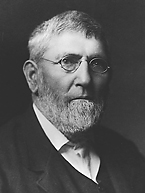
 [It was normal for travelers to share a bed in that era.] And he seemed to be proud of it! Aside from being an infringement on the Jim Crow law, it is a violation of Christianity itself, and of all common decency. Such conduct forfeits the respect of right-thinking people, and would be calculated to stir up demonstrations in most any community if it should become generally known.
[It was normal for travelers to share a bed in that era.] And he seemed to be proud of it! Aside from being an infringement on the Jim Crow law, it is a violation of Christianity itself, and of all common decency. Such conduct forfeits the respect of right-thinking people, and would be calculated to stir up demonstrations in most any community if it should become generally known.
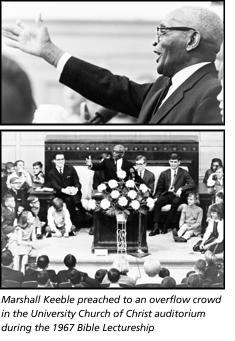
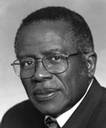 An African-American preacher in the Church of Christ and lawyer,
An African-American preacher in the Church of Christ and lawyer, 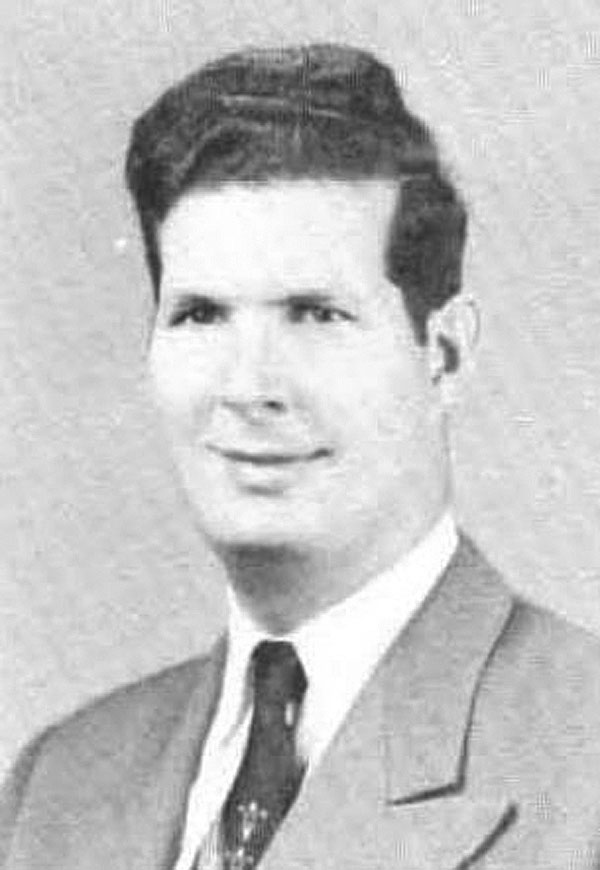 (
(